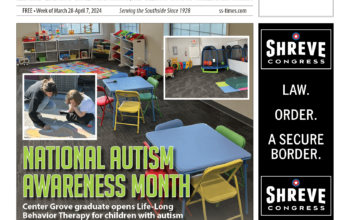By Sherri Coner
Since 1999, more than 15,000 Hoosiers have died from drug overdoses. In fact, more people in Indiana die from overdoses than car accidents. Nearly one in 12 people residing in Indiana fit the criteria for having a problem with substance abuse, whether it’s alcohol or drugs. And because the disease of addiction is progressive, meaning that an addict’s use increases with their tolerance level, the use of psychostimulants, such as cocaine, meth, Adderall and Benzedrine are on the rise alongside synthetic opioids. Hoping to get the attention of a family in denial or to aid a family looking for help before they too bury a loved one, these three families are sharing their stories about how addiction took their children.
SUTHERLAND FAMILY
“I will never forget that call at midnight,” said Center Grove resident Debbie Sutherland. “All we heard was, ‘He killed my baby.’ And that scream. It was heartbreaking. It changed our whole family forever.”
The night Sutherland described occurred five years ago when Veronica, her 25-year-old niece, was murdered.
As a young child, Veronica suffered great emotional pain when her mother left.
She grew angry and resentful.
By age 14, she was incorrigible.
Hoping that a change of environment would help, Sutherland and her husband John brought Veronica to live with them.
Looking back now, they think she needed a life change much earlier.
“We were too late when we took her,” Sutherland said. “She was already streetwise.”
At the time, the Sutherlands’ daughter and granddaughter were also living with them.
Initially Veronica shared the same bedroom with their 7-year-old granddaughter.
“Veronica came in with devil-worshiping stuff,” Sutherland said. “So we moved our granddaughter in with her mom.”
After residing with her aunt and uncle for a year, Veronica wanted to go home to her father.
Unfortunately her anger and emotional problems mounted and so did her abuse of substances. Eventually, Veronica faced legal problems and was addicted to drugs.
She very rarely had family contact.
Her family could think of nothing more to do for her except to pray for her safety.

For a few months, those prayers were answered.
As her 25th birthday approached, Veronica was close to celebrating a year of being clean and sober.
She adored her baby boys, ages 3 and 13 months.
Her longtime artistic talents began to bloom again, and she spoke of studying art, maybe teaching art.
Finally, she had cut ties with the physically abusive father of her children who was actively using drugs.
Veronica was stronger and happier. She looked forward to a healthy future with her children.
Her family was ecstatic. Their prayers for the hurt little girl who grew into such a self-destructive young woman were being answered. She was finally home.
Two weeks before Veronica’s 25th birthday, she impulsively agreed to meet the ex-boyfriend.
It was a meeting that cost the beautiful, talented young woman her life.
Veronica’s lifeless, severely beaten body was found a few days later.
An autopsy revealed that a large amount of fentanyl was in her system.
Before the law could catch up with him, the boyfriend left for Mexico.
He is believed to still be there, avoiding consequences for Veronica’s murder.
Sutherland’s devastated brother and sister-in-law took immediate custody of their grandsons.
A parade of photographs in their home keeps Veronica’s memory alive for her children.
“I go over to the cemetery to tell Veronica how much I miss her,” Sutherland said. “I tape pictures of her sons to her headstone. There’s not much else we can do.”
TYLER COFFEY
TOM, JEANETTE MAILS
“Tyler was not home for the holidays. He was in and out of jail and in and out of rehab every year until he died,” Jeanette Mails of Whiteland said of the last five years of her son’s life.
No matter how much Jeanette and her husband Tom prayed for Tyler’s healing, they braced themselves for a day when reviving him was impossible.
“I thought I was prepared for the eventuality,” Jeanette said.
While Tyler was on house arrest the last time, his drug screens were clear, his attitude was cheerful, and he also had a job he enjoyed. He seemed happy and he was more of the son he was years ago before drugs.
Maybe Tom and Jeanette dropped their guard.
Maybe they allowed themselves to believe Tyler was finally on his way to truly being OK this time.
As Tom pulled into the driveway one evening and raised the garage door like always, every parent’s nightmare grabbed them both around the neck.
Tyler’s lifeless body was sprawled on the garage floor next to his car.
Terrified, they jumped out of the car and ran toward him.
“He had been charging up his house arrest anklet since he had to work that night,” Jeanette said.
“I don’t really remember much. My husband pushed me out of the garage and started doing CPR.”
A neighbor showed up and took over CPR compressions so Tom could comfort his wife.
Maybe they were in shock.
And maybe the shock stayed for a while, to urge their shattered hearts to keep beating.
Although Tom has daughters from a previous relationship, Tyler was Jeanette’s only child.
He died from fentanyl poisoning at age 23.

“It was surreal for a long time,” Jeanette said. “I had convinced myself that he was over the hump.”
His life had been saved numerous times by Narcan and CPR.
But this time Tyler was truly gone.
Jeanette and Tom trace the beginning of Tyler’s drug use to age 18, when he started to abuse two prescribed medications, one to treat ADHD as well as Xanax.
“Within a year of doing that, someone had introduced him to heroin,” Jeanette said.
During the five-and-a-half years of addiction nightmares that followed, Tyler moved out for a year.
Then he returned.
“He said that was the most self-destructive he had ever been, during that year of living alone,” Jeanette said.
During the stretch of years that followed, Tyler’s name frequently showed up in the newspaper for drug-related arrests. Family members timidly asked about him, only to learn that he was behind bars or in rehab again.
Both parents admit they felt embarrassed. They felt like failures. They felt ashamed.
They didn’t know anything else to do than what they were doing but none of it worked.
Sending Tyler to rehab and counseling wasn’t enough.
But what would have been enough to save him from himself?
After losing Tyler, Tom and Jeanette found their voices.
“Now we tell anyone who will listen,” Tom said.
“Sharing our story has been so healing for both of us,” Jeanette said. “We want to bring about more awareness and let parents know they are not alone.”
ZACHARY MUENCH
DEE ANN BINGHAM-MUENCH
Every day, Dee Ann Bingham-Muench and her husband, Tim struggle to breathe around the pain of losing Zachary, Tim’s only son and Dee Ann’s only child.
After graduating from Center Grove High School in 2012, Zachary attended dMarian University on a golf scholarship, with a plan to study nursing.
During his high school years, when they learned of Zach’s heavy drug use, Tim and Dee Ann were in disbelief. They intervened with counseling and treatment but helplessly watched their once popular boy with tons of friends turn into a secretive, constantly sleeping loner.
By the time college admissions came around, Zach seemed to have both feet on the ground again. With golf as their mutual love, father and son were nearly always together.
In college, “Zach played golf with all the seniors on the team,” his mother said. “They were all drinking and smoking weed so there was a lot of peer pressure.”
Knowing they could not somehow lock Zach in a protective bubble, Dee Ann and her husband tried to keep a constant hand on their son through frequent phone calls and pop-in visits on campus.
“Then a friend of Zach’s at college called to tell me that Zach was using heroin,” Dee Ann Bingham-Muench said. “We pulled him out of school that day and put him in treatment.”
They also moved as a family into their winter home in Florida, hoping Zach could get a fresh start.
And again, Zach seemed to find his footing. While living at home again, Zach enrolled at Florida Southwest State College and finished his degree.
“He applied for nursing jobs and practiced his interview skills,” Dee Ann Bingham-Muench said. “He got a job in an ER, and he was on cloud nine.”
Showing off his new scrubs, Zach Facetimed both of his parents.
This new blessing happened on Thursday, June 5, and Zach was set to start his new profession the following Monday, June 8.
When Bimgham-Muench saw her sweet boy’s face in the Facetiming moment, she zeroed in on one of his nostrils, which was red.
At the time, she was out of town but hurried to leave a meeting. “I’ve got to go home, Zach has used,” she said.

When she couldn’t get a flight out until morning, she called Zach’s dad in a panic.
“His dad said he was fine. They had pizza together.”
Of course, there was no way to know that when Zach proudly left the job interview that day, he impulsively purchased cocaine.
“But 95% of it was fentanyl,” his mother said in a near whisper.
When Tim went to bed that evening, Zach went into the bathroom and snorted the remainder of his purchase. “Something woke Tim up at 1 a.m.,” Bingham-Muench said. “He went in to check on Zach, and he was already gone.”
When Tim called to share the heartbreaking news, “I already knew it,” Dee Ann Bingham-Muench said. “I just already knew it.”
A celebration of life for Zachary, age 26, the son who was so close and yet so far away from living his dreams helped them remember who he was before drugs took him so far away.
“All of Zach’s old friends came,” Bingham-Muench said.
Not long after that, anger began to burn like an inferno in this grieving mother’s chest.
“I was on a mission,” she said. “I broke into Zach’s phone and wrote down all of his contacts. I put timelines together. I called an FBI agent.”
At last, Bingham-Muench’s mission was accomplished.
She found her son’s murderer in Florida.
“He killed 10 people in five days with the fentanyl he had. That’s 10 people in five days,” she said. “They got him, his girlfriend and others. He is connected to the cartel.”
In March 2022, Marvin Harris Jr. aka “Mesh,” 23, was sentenced to 24 years and five months in federal prison.
“This is my purpose now,” Bingham-Muench said. “Every nine minutes someone dies from fentanyl. It’s killing off a generation. I don’t want another mother to go through what I have. There are no words when you lose a child.”

